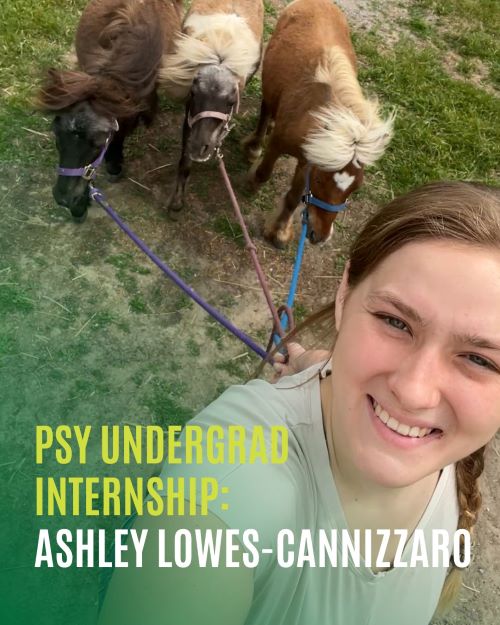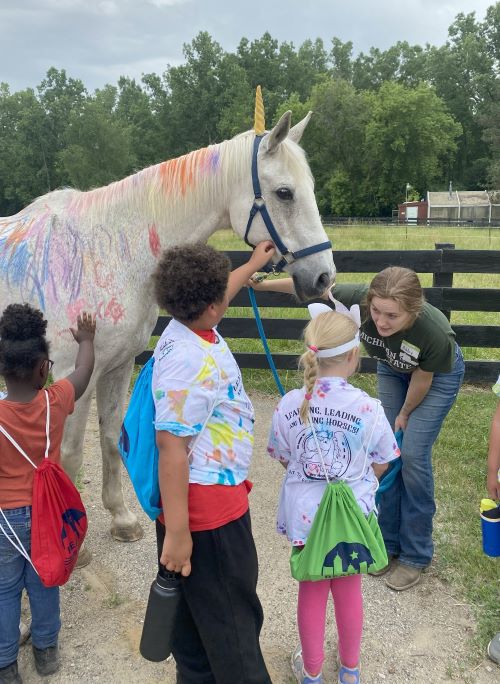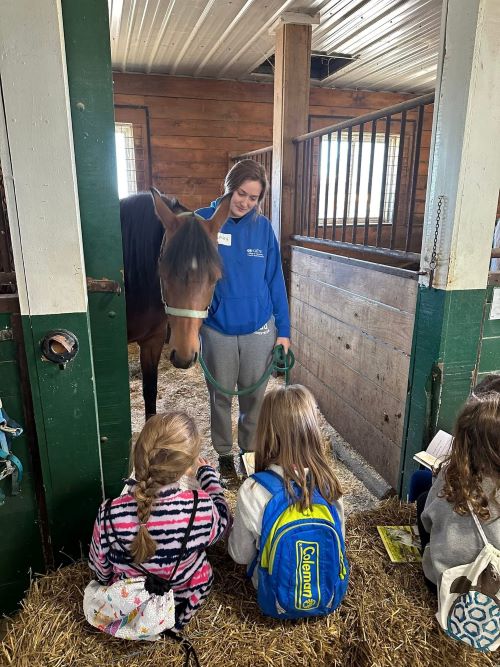PSY Internship Spotlight with Ashley Lowes-Cannizzaro
August 1, 2025 - Shelly DeJong
 Meet Ashley Lowes-Cannizzaro, a fifth year Michigan State University student double majoring in Animal Science and Psychology with a Bioethics minor. This summer, Ashley is interning at the Equine Center for Learning (ECL) through the Lansing School District, a therapeutic and adaptive riding center that services individuals with a wide range of cognitive, emotional, physical and developmental differences. ECL utilizes horsemanship, relationship building, and individualized instruction to help individuals develop their skills and confidence, coordination, emotional regulation, and socialization.
Meet Ashley Lowes-Cannizzaro, a fifth year Michigan State University student double majoring in Animal Science and Psychology with a Bioethics minor. This summer, Ashley is interning at the Equine Center for Learning (ECL) through the Lansing School District, a therapeutic and adaptive riding center that services individuals with a wide range of cognitive, emotional, physical and developmental differences. ECL utilizes horsemanship, relationship building, and individualized instruction to help individuals develop their skills and confidence, coordination, emotional regulation, and socialization.
What kind of things are you doing at this internship?
There are two different internship routes you can take at ECL: program management and equine management. I am doing both, giving me an incredibly diverse set of experiences that span equine care, adaptive riding instruction, and lesson planning. On the equine side, I’ve learned how to assess vitals, administer medications (learning things like how administering it under the tongue is better for absorption), wrap legs, handle horses during professional appointments with the chiropractor and farrier, and understand herd dynamics.
I have also learned to create efficient, safe, and functional facilities. I have conducted mock and actual lessons, practiced supporting riders while they mount and dismount, using a variety of supports (ramp, stairs, mounting block, etc.), made adjustments to tack for individual needs, worked with children during field trips and summer camps, and more! I have created warm-ups, cooldowns, and mounted activities that develop fine and gross motor skills. I have also been focused on effective, strengths-based feedback. Instead of providing generic praise like “well done”, I aim to give explicit and intentional feedback and encouragement that supports skill development and emotional connection.
Why did you want to intern here?
Interning at ECL allows me to take a step toward the work I envision for myself in the future. My views strongly align with ECL’s mission to support individuals through adaptive, compassionate horsemanship and equine coregulation/rehabilitation. At ECL, every session is personalized, each rider is seen as whole and capable, and every interaction is grounded in respect for both the humans and horses involved. I am also very grateful for the staff (Lena, Charlotte, and Taylor). In all respects, they have been present in my experience in providing a vast amount of resources to build on my learning, giving me feedback and examples on how to best improve my practice, and in general, creating a space that encourages me to grow both as a practitioner and as a person. I feel secure enough to try new things, supported if I make mistakes, and motivated to always continue learning, even when some days are more difficult than others.
 How has your education prepared you for this internship?
How has your education prepared you for this internship?
Psychology has significantly influenced how I perceive and do things at ECL. The coursework that I have completed, like abnormal psychology, social psychology, and personality psychology, has helped me identify certain behaviors and needs, making me better equipped to respond accordingly. I have also built on my psychology knowledge throughout my internship by learning more about a few types of diagnoses that are commonly seen at ECL like autism spectrum disorder, attention-deficit/hyperactivity disorder, sensory processing disorder, Cerebral Palsy, and Multiple Sclerosis. There are many cases of comorbidity which manifest differently and require adjustment in communication, praise, expectations, and safety strategies to best support the students.
Equally important are my studies in animal science and bioethics. Animal science helps me assess the horse's behavior, which acts as a mirror to the students' feelings and energy. I also feel better prepared to work with horses on a daily basis and think about their welfare first. Moreover, I think the concepts in bioethics that I have studied have made me more conscious of the language, power, and values present in therapeutic spaces. I took a class called Disability in a Diverse Society, which talked about the importance of person-first language, which is an essential part of ECL, to create an environment in which people are seen beyond labels. Understanding the why behind every interaction, cue, or choice helps to offer the utmost care and creates instruction that is intentional, reflective, responsive, and in line with the best practices for equine welfare and human healing.
What has surprised you the most about your internship so far?
One of the things that surprised me the most was just how much language can mean, not only in the words you use but also in the way that you use them, including the body language that goes along with it. It seems obvious, but many of us, at least I, hadn’t thought as in depth about it as I probably should have. I had a moment with a student where I praised her by saying “Good job,” to which she paid no mind and kept looking at the ground. I recognized I was not using specific praise and tried again as we went over the bridge, saying, “I love that you made sure all four of her [Ayla, one of the miniature horses] feet were off before turning.” Her [the student] face lit up as she looked up at me, smiling. This really showcased to me how common praise dulls in comparison to the importance of specific, intentional praise that creates connection and confidence.
It’s also been an adjustment to how much problem-solving goes into every moment; from choosing the right horse for a rider based on tack available, horse condition, temperaments, etc., to adapting when buses run late, horses get injured, or as students' emotions affect their day/lesson. Every student has different needs, and things are always changing, so it takes creative thinking, observation skills, and most importantly, self-reflection of one’s own emotions and experiences, to best support the students, horses, and fellow coworkers.

My main suggestion would be to seek an internship that reflects your passions, values, and ultimately, where you want to go long-term. This will help you gain insight into whether this is really the route you want to steer your life down. Look for places that allow you to grow into your authentic self. Additionally, don’t be afraid to make mistakes, ruin your [lesson] plan, or over-tighten a girth, so long as you are learning from it. Curiosity and questions are also key attributes to have. Be open to feedback and let yourself be mentored. Lastly, try and find a team that is committed to welfare, inclusion, and respect for all beings, a team that walks their talk.
What are your hopes for the future?
My dream is to open a trauma-informed, inclusive wellness center. My aim is to become a licensed clinical social worker so I can provide therapy sessions. I intend to become an equine-assisted psychotherapist where I can co-facilitate therapy sessions with horses. I want to build a wellness center that has a fitness center for movement and emotional regulation, nature-based healing spaces (like reflexology pathways and gardens), a retail therapy area, and a library for educational and reflective spaces. I envision building a safe space for healing that is holistic, accessible, and based on compassion and connection. A place where everyone feels included, seen, and supported. A place where people learn to regulate not just through talk therapy, but through connection to their bodies, breath, and nature. Interning at ECL has significantly furthered that vision for me. It has shown me that healing doesn’t have to look clinical to be effective. It can look like tight muscles relaxing through a horse's movement, a child smiling after facing a fear or a reflective moment while pulling weeds. That’s the future I'm working to build, one day and step at a time.

